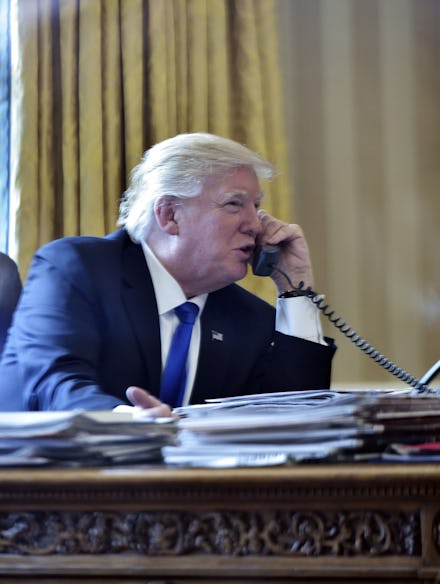If Trump did in fact work with Russia to win the 2016 election, could he be impeached?

Late Tuesday night, the New York Times reported that United States officials say that intelligence and law enforcement agencies have confirmed that communication repeatedly occurred between the Donald Trump campaign team and Russian spies.
The explosive allegations bring back the controversies of Trump's 2016 campaign, which came to a head when Democratic challenger Hillary Clinton said during a debate that the businessman would be a "puppet" of Russian president Vladimir Putin if elected.
Throughout the campaign, allegations were made of a Kremlin connection to Trump's team, which focused on then-campaign manager Paul Manafort. He was eventually replaced by Kellyanne Conway amid questions about his involvement with pro-Russian interests in Ukraine.
Suspicion about Trump's possible connections to Russia took a backseat to his whirlwind first days as president, until the resignation of national security adviser Michael Flynn. Prior to the president's inauguration, Flynn reportedly had many phone calls with the Russian ambassador, five of which are said to have occurred the day former president Barack Obama placed sanctions on Russia for meddling in the U.S. election.
While Flynn is out, questions remain about the president's connection to Russia. Trump, despite his endless volatile tweets against anyone who stands in his way, refuses to criticize Russian's authoritarian president. A widely disseminated dossier claims Russia has compromising information about Trump, and his refusal to release tax returns makes it almost impossible for the American public to decipher whether the president is financially entangled in Russia.
Even more sinister is the allegation that Trump colluded with Russia to harm his Democratic opponent and win the presidency. A Politico op-ed directly posits the possibility that Trump "colluded" with Russia to hack the election.
What if it's true?
Can Trump be impeached?
Absolutely. There's a common misunderstanding that a president must commit an act of clear, provable treason to be impeached. Here is the relevant section of Article II in the U.S. Constitution.
The president, vice president, and all civil officers of the United States shall be removed from office on impeachment for, and conviction of, treason, bribery, or other high crimes and misdemeanors.
The phrase of note is "high crimes and misdemeanors." A "high crime" is one that can only be committed by a government officials, and there is absolutely no exhaustive list of what those crimes are in the Constitution.
While some will make an argument that assisting the Russian president in influencing a U.S. election constitutes an act of treason, the possibility of impeachment remains regardless of this fact.
The expansiveness of what constitutes a high crime makes triggering impeachment against an elected official who rigged an election and remains subservient to a foreign power a clear possibility without any contemporary legal precedent prohibiting such an impeachment.
Bill Clinton, the only president to be impeached in recent history, was not charged with committing an act treason or bribery, rather lying under oath and obstruction of justice.
Would Trump be removed from office?
The U.S. has never removed a president from office through impeachment. Only two presidents have ever been impeached at all, Bill Clinton and Andrew Johnson. Both were acquitted by the Senate.
However, Richard Nixon resigned from office in 1974 after the beginning of impeachment proceedings, anticipating he would likely be successfully convicted.
While a president has never been removed from office, the legal framework is clearly established and the impeachment process by which a president would be removed has been successfully executed on two other occasions and initiated three times.
The question of whether U.S. House and Senate Republicans would actually vote to impeach and convict Trump is an open one. But given the historic positions of the Republican Party on U.S. sovereignty, along with the disgust many Republicans showed for Trump before his presidency, there's no sure bet the GOP would stand for a president who rigged an election through coordination with foreign opposition.